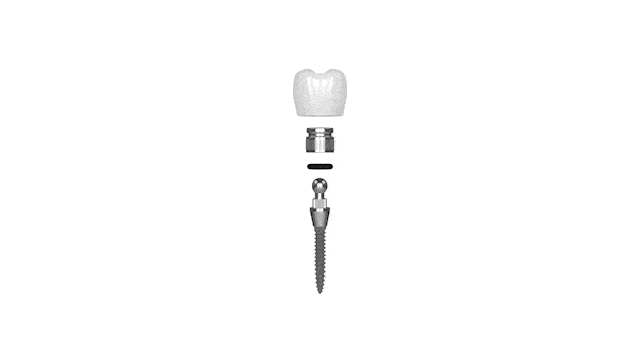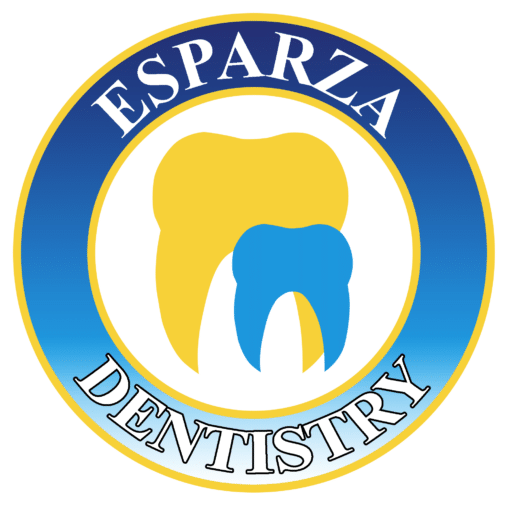Dental Implants in Ontario, CA
Tooth loss can impair your ability to eat and speak normally, leading you to change your eating habits, hide your smile, and even avoid social activities you once loved. If you are frustrated by your missing teeth, dental implants can help. Whether you want to replace missing teeth or stabilize your dentures, Esparza Dentistry provides expert dental implant placement in a friendly and compassionate atmosphere.
What Are Dental Implants?
Dental implants are a type of dental prosthesis that replaces the entire missing tooth from the root to the crown. Whether you have lost teeth due to dental trauma, decay, gum disease, or other situations, implants effectively fill the gap in your smile. You may benefit from dental implants if:

- You want to replace individual missing teeth with a crown
- You want to replace one or more missing teeth in a row with a bridge
- You want to restore a full arch of teeth with a permanent denture
- Your current dentures are loose or ill-fitting, and you’d like to anchor them permanently
While implants are an effective solution to missing teeth, you may not qualify for dental implants if:
- You are under 18 years old
- You have poor oral hygiene or substantial decay
- You have gum disease (periodontitis)
- You have vascular or bone disease
- You smoke
- You are receiving chemotherapy or radiation
- You take certain medications
- You have diabetes
Benefits of Replacing Teeth with Dental Implants
Maintain the Integrity of Your Bite
When you lose even one tooth, neighboring teeth naturally shift toward the gap, leading to a misaligned bite. An altered bite weakens your bite force, compromising your ability to chew normally. You may also experience teeth grinding, speech problems, and difficulty cleaning your teeth due to an uneven bite.
Dental implants stop your teeth from shifting by filling the gap left by missing teeth.
Prevent Bone Loss and Preserve Your Facial Appearance
The root of your tooth plays an important role in maintaining the health of your jaw. When you chew, the root sends a signal to generate bone tissue and send nutrients to the jawbone. If a tooth is lost or extracted, the pressure of your bite no longer stimulates the jawbone, meaning that your body thinks the jaw isn’t needed. Without this stimulation, the bone begins to recede.
This process of resorption has many negative consequences. Without a healthy jawbone, you may experience pain or discomfort when you chew, difficulty speaking, headaches, and facial or jaw pain. Jawbone deterioration also leads to changes in your facial appearance that make you look older. Facial collapse causes premature wrinkles, lips that sink inward, a more pronounced and pointed chin, and an overall caved-in appearance.
An advantage of dental implants for replacing missing teeth is that the implant is screwed into your jawbone, mimicking your natural tooth root. As a result, dental implants are the only dental restoration that prevents bone loss. The implants restore the bite force needed to stimulate the jawbone and preserve its strength. With dental implants, you will regain a healthy bite and maintain the appearance of your face.
Traditional Dental Implants
Traditional implants have multiple components, including a metal screw, a prosthetic dental appliance, and the abutment piece that connects them. The width of the screw measures approximately 5 mm and is implanted directly into the jaw. While the size of the implant provides a stable foundation, it comes with some drawbacks. The large screw takes up significant room in the jawbone and requires a more invasive procedure than pioneering mini dental implants.
As a result of the screw’s size, patients often require bone grafting to be eligible for conventional implants. Bone grafting adds to the jawbone’s volume and density by transplanting bone tissue from other areas of your body or from an animal or human tissue bank. Before the implants can be placed, the jawbone has to heal from the grafting procedure, which adds to the treatment timeframe.
The implant screw fully integrates with the jawbone in a process called osseointegration, which takes place over several months. After this healing period, the abutment can finally be connected to the screw, and the crown, bridge, or denture can be attached.
Patients with a narrow jawbone or those looking for a quick, easy, and cost-effective replacement for their missing teeth may not find conventional implants suitable.
The Mini Dental Implant Advantage
Mini dental implants are the preferred alternative to traditional dental implants. If you want to replace your missing teeth fast and economically or are reluctant to undergo complicated multi-step procedures, mini implants may be right for you.
Mini implants are half the size of traditional implants, measuring less than 3 mm in diameter. While traditional implants have a separate abutment piece, the connector on a mini dental implant is built into the screw. This streamlined design decreases the procedural steps needed to place the implant.
Mini implants are just as effective as the conventional option, but they come with a host of benefits as a result of their size and design:
- Simple and gentle procedure: Placing the implant is much less complex than conventional implants, saving you time in the dental chair. The minimally invasive procedure usually requires no surgical flaps or sutures, so you’ll be more comfortable during and after the implantation.
- Immediate results: Owing to the simple procedure, placement of mini implants can typically be completed in a single office visit, allowing you to flash your beautiful new smile immediately. This is a significant advantage over traditional implants, which require long healing periods, especially if a bone graft is needed.
- Quick recovery: Most patients can return to work or school and resume their daily routines in 24-48 hours. If you are looking for a swift solution to replace your missing teeth, mini implants are a great option.
- Budget-friendly: Mini implants are more cost-effective than conventional implants because less material and fewer procedural steps are needed.

How Long Do Dental Implants Last?
Because dental implants provide the same stability as your natural teeth, they can last a lifetime with proper care. Restorations like crowns, bridges, and dentures can last 10-20 years or even longer.
Caring for Your New Smile
Caring for your dental implants may be simpler than you think. Be sure to follow the same oral hygiene recommendations as you would for your natural teeth, such as brushing twice a day with a soft-bristle brush and fluoride toothpaste. You should also floss daily and use an antibacterial mouthwash to prevent plaque buildup. Avoid grinding your teeth or clenching your jaw at night, which can cause damage. Wearing a custom night guard will take excess pressure off the implants.
Because dental prosthetics can stain just like your natural teeth, reducing your intake of dark foods and drinks can keep your smile gleaming. Regular cleanings and checkups at Esparza Dentistry will help extend the life of your dental implants.
Smoking has a negative effect on every dental procedure, so if you smoke, you should try to quit.
How Much Do Dental Implants Cost?
At Esparza Dentistry, we realize that cost can be a barrier to dental treatment. We aim to make high-quality oral healthcare accessible to our valued patients by offering flexible financing options. We will gladly discuss our various payment options at your consultation.
If you are looking for a budget-friendly solution to replace missing teeth, mini dental implants are the answer. The exact cost of dental implants depends on several factors, including the size of the post, the number of implants, the type of restoration, and whether other treatments are needed. At your consultation, we will design a treatment plan that considers both your oral needs and your budget.
Schedule a Free Dental Implant Consultation at Esparza Dentistry
At Esparza Dentistry, we believe that everyone deserves functional teeth and a radiant smile. We offer quick, gentle, and cost-effective options for replacing your missing teeth with mini dental implants. Whether you have lost a single tooth, multiple teeth, or all of your teeth, we can help. With over 25 years providing expert dental care in Ontario, CA, we can customize a treatment plan that aligns with your needs and goals.
Schedule a free consultation today to learn how implants can mend your bite and restore your smile.
Related Videos
- What is a Dental Implant?
- What is a Mini Dental Implant?
- Mini Implants vs. Conventional Implants?
- Are Mini Implants as Good as Regular Implants?
- Do You Offer Free Implant Consultations?
- The Mini Dental Implant Process
- How Long Do Mini Dental Implants Take To Heal?
- What If I Don’t Have Enough Bone for a Dental Implant?
- Will I Require Bone Grafting for a Mini Dental Implant?
- Bone Grafting Alternatives
- Am I Too Old for an Implant?
- What If I’m Missing a Single Tooth?
- What If I’m Missing Multiple Teeth?
- How Long Do Mini Dental Implants Last?
- Are Mini Dental Implants Painful?
- Can I Get a New Tooth the Same Day as an Extraction?
- Can Mini Dental Implants Replace All of My Teeth?
- How Much Does a Mini Implant Cost?
- Are Dental Implants Covered By Insurance?
- Financing for Dental Implants
- Financing for Mini Dental Implants
